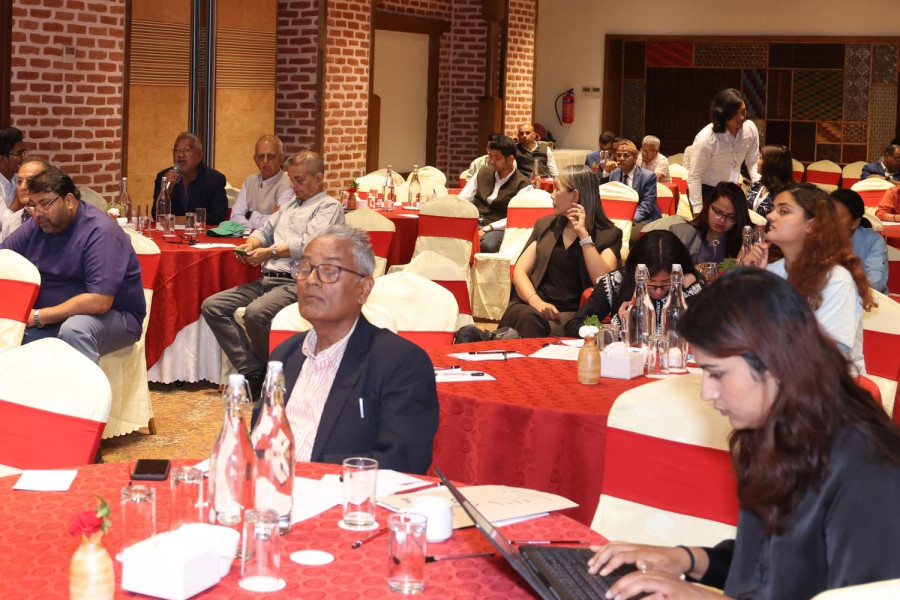National
Experts call for effective countermeasures for curbing terrorism in South Asia
Some suggest Nepal review policy of neutrality, especially in view of terrorist attacks.
Post Report
Experts, ministers and diplomats have discussed the persistent threat of terrorism in South Asia, with focus on Nepal’s vulnerabilities and the need for effective countermeasures.
Organised by the Centre for Social Innovation and Foreign Policy (CESIF), observers and diplomats stressed the need for robust measures for tackling terrorism, data-sharing, strengthening the human resources and technology while revamping Nepal’s immigration system.
During a panel discussion on “Policy response for addressing the implications of terrorism for Nepal”, they explored Nepal’s responses to terrorism, underscoring institutional weaknesses, regional complexities, and the urgent need for a strategic shift in national security thinking.
Former foreign minister NP Saud said that terrorism in South Asia poses a serious spillover risk to Nepal, warning that “vulnerabilities are no longer only at others’ homes—we are also open to them”.
He highlighted systemic flaws in immigration management, referencing past lapses like the IC 814 incident, where Nepal failed to classify the perpetrators as terrorists or coordinate diplomatically with the country of origin of the terrorists. The incident refers to the hijacking of an Indian Airlines Airbus after takeoff from Tribhuvan International Airport in December 1999.
He called for integrated immigration-security mechanisms and cautioned that ad hoc responses can’t ensure long-term protection.
Raj Kishore Yadav, chairman of the International Relations Committee of the House of Representatives, noted “Nepal’s silence on the Pahalgam attack” as a diplomatic “misstep” and lamented Parliament’s continued failure to frame terrorism as a national issue.
He asserted, “Nepal should have been more assertive and explicitly sided with the victim side”.
Shanker Das Bairagi, former national security adviser and foreign secretary, emphasised Nepal’s normative commitments to international conventions but admitted that the implementation gap “depreciates our credibility”.
He identified immigration and intelligence as critical vulnerabilities and called for institutional reforms to enhance data-sharing and deterrence capabilities.
Former foreign secretary and ambassador Durga Bhattarai noted that “terrorism anywhere is terrorism everywhere” and raised questions about Nepal’s reactive posture and lack of extradition consistency.
Another former ambassador, Dinesh Bhattarai, traced the ideological roots of South Asian terrorism to the differences in religion, and statistically described how Hindus are the clear target.
Overall, the panel called for Nepal to move beyond symbolic condemnation and invest in cohesive legal, diplomatic, and institutional frameworks that treat terrorism as a real and present threat to national security.
In the second panel discussion themed “Nepal’s security vulnerabilities and citizen implications”, the speakers called for a more assertive and strategically aligned national security posture.
Major General (Retd) Binoj Basnyat highlighted the shifting nature of warfare in South Asia, shaped by technology, proxy conflicts, and big power rivalries, stating that Nepal’s counterterrorism efforts currently rely heavily on soft diplomacy but lack proactive mechanisms.
“We must revisit the way our security is maintained,” he said, emphasising that Nepal’s experience with past insurgencies does not adequately prepare it for emerging transnational threats.
Former foreign secretary and ambassador Madhu Raman Acharya strongly urged Nepal to take a principled stance on regional terrorism, particularly in cases like the Pahalgam attack, stating that “Nepal should have clearly sided with India” and used such incidents as diplomatic openings to build trust with India.
He added “South Asia is a ‘hotbed’ of terrorism! Asymmetric warfare is another word for terrorism, insurgency is another form of terrorism”.
CESIF’s Executive Chairperson and former ambassador Vijay Kant Karna emphasised the serious and evolving nature of terrorism in South Asia and its direct effects on Nepal. He highlighted Nepal’s vulnerability as a potential transit point for terrorist operatives.
Writer Amish Mulmi echoed this sentiment, pointing out that although terrorism may not originate in Nepal, it directly affects the country through its migrant population and regional dynamics.
He noted that “as terrorism has clarity in target based on religion, counterterrorism efforts should also have clarity in response”. He observed that the regional security landscape is undergoing a doctrinal shift, where India now treats any act of terror as an act of war and no longer differentiates between state-backed and non-state actors.
Apekshya Shah, the head of Master’s in International Relations and Diplomacy programme at Tribhuvan University, called for better intelligence coordination and academic capacity-building.
The panel underscored Nepal’s need to reassess its neutrality-based foreign policy, invest in evidence-based counterterrorism capacity, and elevate national conversations on security beyond the government to include academia and civil society.
The seminar culminated in a unanimous agreement among the speakers on the missed opportunity to clearly stand with India in the aftermath of the Pahalgam terrorist attack.




 13.12°C Kathmandu
13.12°C Kathmandu













